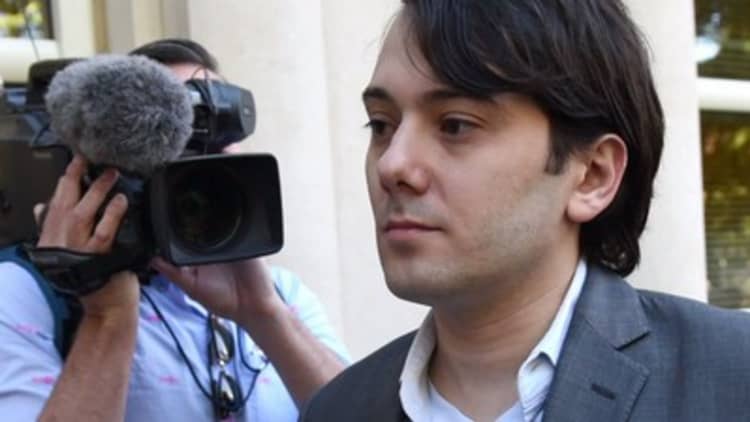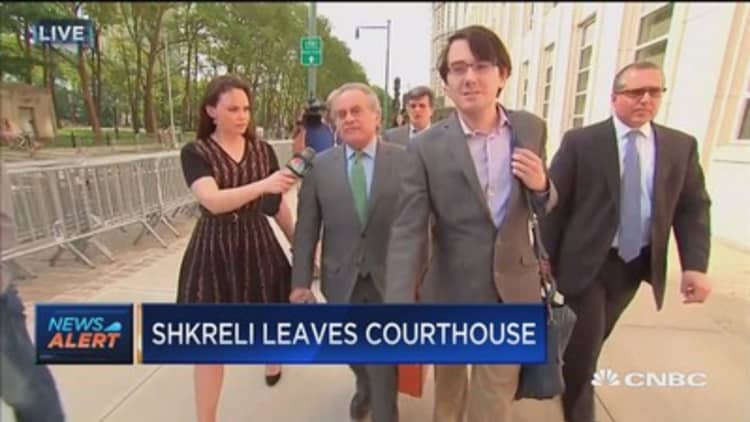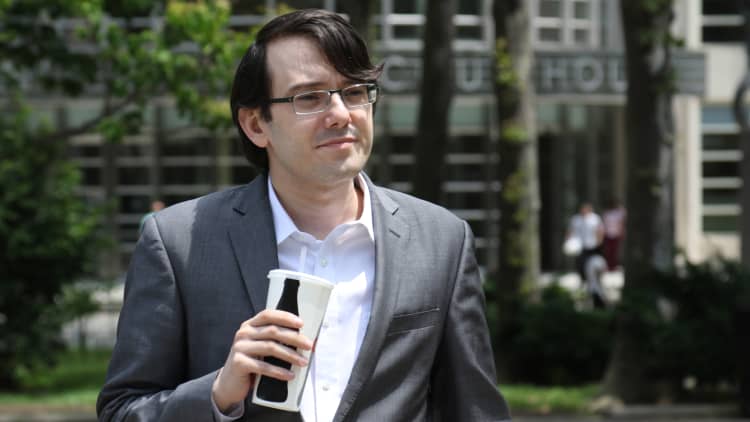
Back in 2007, Martin Shkreli "wanted to be Stevie Cohen" — but the "pharma bro" tended to give bad stock tips and blew through nearly $5 million of an investor's money at his hedge fund in less than one year, the investor testified Friday.
"Sorry for all the inconvenience," Shkreli emailed that investor, Josiah Austin, after the steep loss of Austin's entire stake in his fund, Elea Capital.
Shkreli, now 34, later reneged on a promise to try to repay investor Josiah Austin by gifting him a stake in Shkreli's new drug company Retrophin when it was being launched, Austin testified in Brooklyn, NY, federal court.
"No, I don't think he had my best interests at heart," Austin said of Shkreli and his handling of Austin's money.
He also said that now-defunct financial giant Lehman Brothers ended up suing him to try to recoup about $2 million the firm lost from Shkreli's trading at his hedge fund Elea Capital in the mistaken belief that Austin had promised to cover any trading losses for Shkreli.
Austin's testimony added to a picture of prosecutors are painting of Shkreli at his trial on securities fraud charges.
That picture is someone who was a serial failed investor of other people's money, one who dragged his feet at turning over tax documents about that money, and someone who dropped the names of other investors.

One of them legendary pharmacy executive Fred Hassan, was touted as being an investor in Retrophin by Shkreli in 2011, according to Austin. But Hassan never invested in Retrophin, his daughter Sarah testified Thursday in the same courtroom.
Fred Hassan took the witness stand after Austin.
Hassan is former CEO and chairman of Schering-Plough, and ex-chairman of Bausch & Lomb. He currently is a managing director of private equity firm Warburg Pincus, and serves on the board of Time-Warner.
Prosecutors had Hassan detail the fact that he recalled meeting Shkreli once, briefly, at the request of his daughter, but then never personally invested with Shkreli or in Retrophin, or ever served as an advisor to him.
"He was a pleasant person, very respectful," Hassan said of his short meeting with Shkreli at the J.P. Morgan Healthcare Conference in San Francisco in January 2011. "He seemed to be a little intimidated by me."
Hassan said Shkreli struck him as "a homework person ... an analytic person." Hassan is a CNBC contributor.
During cross-examination by Shkreli's lawyer Benjamin Brafman, Hassan said that more than 90 percent of the money invested in his family's hedge fund, DynaGrow, belongs to himself and his wife.
Their daughter Sarah, who manages that fund, had invested $125,000 of DynaGrow's money in Retrophin when the company was being created.
Sarah Hassan, who herself did invest her personal money with Shkreli's hedge fund MSMB Capital, testified Thursday that she repeatedly had to remind Shkreli to not refer to her father as investor, or director or consultant to Retrophin because she saw documents suggesting he was.
Sarah Hassan had testified that Shkreli for months refused to redeem what she believed to be her $435,000 stake in MSMB Capital after it shut down, and later was told by him that he had used her investment to help capitalize Retrophin.
She later received, after long delays and multiple excuses, $400,000 in cash, and more than 58,000 shares of Retrophin. She ended up selling that stake in the company for $900,000, she testified.
Austin, 70, said he manages about $300 million in his own money through an entity called El Coronado."
Austin said he first met Shkreli in 2005 or 2006 at the bank UBS, while visting people there, and was impressed by him.
"I liked Martin," Austin said "I was very interested in Martin's ideas."
"I thought Martin was young, smart, a little cocky," Austin said.
"I thought Martin wanted to be Stevie Cohen," he said, referring to the legendary hedge-fund chief.
Austin said that he told Shkreli at the the time, that "if he ever went out on his own, I'd be interesting in talking to him."
Shkreli over time time routinely discussed stocks with Austin, and recommended various companies for investment.
"I'd say no," Austin testified, when asked by a prosecutor if Shkreli's tips tended to be profitable.
"I had a pretty substantial loss" after taking a position in one drug company that he started accumulating after a recommendation from Shkreli, Austin said.
Despite that, Austin testified, he eventually placed what ended up totaling $4.8 million in Elea Capital, a hedge fund that Shkreli started, in 2007.
"To make money," Austin said, when asked why he did so.
But he did anything but that.
Elea failed in late 2007 after suffering losses, including all of Austin's stake, he testified.
"I was very upset," Austin testified.
In apologetic email to Austin soon after losing all of Austin's money in Elea, Shkreli wrote Austin an email that said, "I am embarrassed by my performance."
"Sorry for all the inconvenience," Shkreli wrote. "I know sorry doesn't cut it."
Asked if Shkreli ever repaid him for his losses at Elea, Austin said, "No."
He also said he never invested with Shkreli again.
"I had already lost a fair amount of money with Martin, and I didn't want to lose any more," Austin said. "I still thought Martin was an intelligent, smart guy, but I didn't particularly want to do any more business with him."
Shkreli is not charged with anything to do with Elea or Austin. He is accused of looting Retrophin to repay investors he allegedly defrauded while running two other hedge funds, MSMB Capital and MSMB Healthcare, which he formed after Elea.
Shkreli has pleaded not guilty to charges of securities fraud and conspiracy to commit both securities and wire fraud.
Watch: Pharma exec testifies at Shkreli trial



